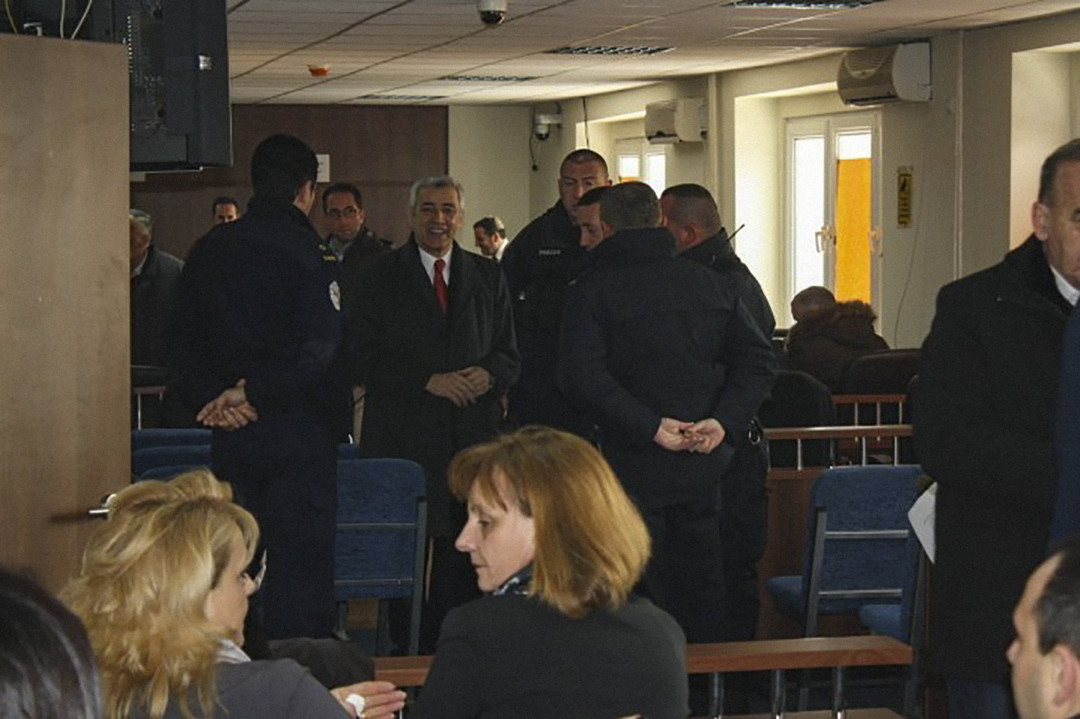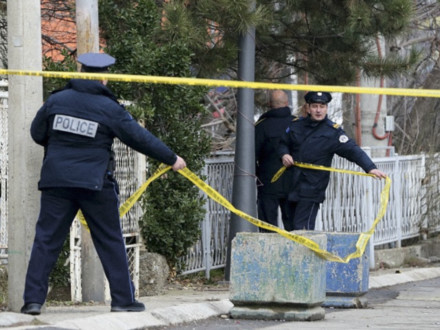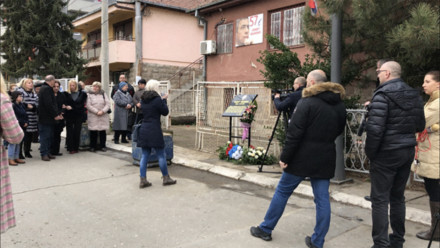16 January 2018
North Mitrovica, Kosovo
Oliver Ivanović
Profession
Politics & Governance
Motive
Governance targeting
Political dissent


Adolfo Olivas


Ahmed Divela


Amit Jethwa


Artan Cuku


Babita Deokaran


Bayo Ohu


Berta Cáceres


Bhupendra Veera


Bill Kayong


Boris Nemtsov


Boško Buha


Chai Boonthonglek


Charl Kinnear


Chut Wutty


Chynybek Aliev


Cihan Hayirsevener


Daphne Caruana Galizia


Darío Fernández


Derk Wiersum


Deyda Hydara


Édgar Quintero


Edmore Ndou


Edwin Dagua


Federico Del Prete


Fernando Villavicencio


Gezahegn Gebremeskel


Gilles Cistac


Habibur Mondal


Igor Alexandrov


Jacob Juma


Ján Kuciak


Javier Valdez


Joannah Stutchbury


José Ángel Flores


Jules Koum Koum


Kem Ley


Luis Marroquín


Mahamudo Amurane


Marcelo Rivera


María Elena Ferral Hernández


Marielle Franco


Milan Pantić


Milan Vukelić


Muhammad Khan


Nelson García


Nihal Perera


Oliver Ivanović


Orel Sambrano


Perween Rahman


Peter R. de Vries


Rajendra Singh


Salim Kancil


Sandeep Sharma


Sikhosiphi Radebe


Slaviša Krunić


Soe Moe Tun


Victor Mabunda


Virgil Săhleanu


Wayne Lotter


Yuniol Ramírez


Zezico Guajajara
16 January 2018
North Mitrovica, Kosovo
Profession
Politics & Governance
Motive
Governance targeting
Political dissent
For Oliver Ivanovic, 16 January 2018 was supposed to be an ordinary day in the office. But it turned out to be his last. As he was entering the offices of his political party in the Kosovan town of Mitrovica North, he was shot in a drive-by attack.
At just after 8 a.m., he was admitted to hospital with five bullets in his chest; after unsuccessful interventions, he was pronounced dead at 9.15 a.m.
As the doctors battled to save Ivanović’s life, and politicians prepared their statements, someone was working to destroy the traces of the crime. Police found a burned-out car three kilometres away from the crime scene, believed to have been the vehicle used by the assailants.
Many killings that have shaken post-war Kosovo have remained unresolved, but the murder of Ivanović seems to be the most difficult for the country’s fragile and fragmented justice system to fathom.
Mitrovica North and three other Serb majority municipalities in northern Kosovo have been a no-man’s-land since Serb forces fled Kosovo in June 1999 following a protracted air campaign by NATO in an attempt to end violations of human rights and stop ethnic cleansing by former Yugoslav strongman Slobodan Milošević’s forces against Albanians, who form the majority in the country.
Despite its independence in February 2008, Kosovo has never managed to exercise its full authority or control in the northern part of Serb-dominated Mitrovica (and other areas), and Serbia has used this vacuum to extend its institutional tentacles into the territory, even though it has no legal power over Kosovo. For 20 years, Kosovan authorities have failed to stabilize the north of the country, where Ivanović’s home town, Mitrovica, is located, creating conditions under which gangs could gain control and crime flourished.
In 1999, Ivanović, an unknown at the time, had put himself forward as a prominent political leader of the Serb community in Kosovo when his town was divided along ethnic lines, with Serbs located to the north and Albanians to the south of the Ibar River, which divides it.
In the first of Kosovo’s general elections, in 2001, Ivanović won a seat in parliament and served as head of a parliamentary group representing Serbs in Kosovo. He became the darling of the diplomatic Serbian community in Kosovo. He was a moderate and cooperated in their attempts to extinguish ethnic animosities between the two main Kosovo communities.
But he faced a political obstacle that was lurking in the background. Ivanović voiced his concerns over how control of his homeland had fallen into dubious hands. In the last interview he gave before his death, he pointed the finger at Milan Radoičić, a political and controversial business figure, as a ‘dark ruler’ in northern Kosovo.
Radoičić, a man with a troubled past and perceived as facilitator of criminal activities in northern Kosovo, is officially sought by the Kosovo police as the man behind Ivanović’s assassination. In June 2018, he became the vice president of Srpska Lista (Serbian List), a party of Serbs in Kosovo that is supported by the Serbian president, Aleksandar Vučić. In the interview, Ivanović said: ‘It worries me horribly that [Vučić] takes [Radoičić] as an example of a person who is fighting for the protection of Serbs in Kosovo.’ He added that ‘the centre of power is not within the municipality building – because the municipality building belongs to this other, informal centre of power’.
In November 2018, the Kosovo police issued a warrant against Radoičić.
Ivanović and Radoičić have a long history of animosity, and Ivanović, it seems, wanted to challenge Radoičić’s hold over this contested territory. But when he stood for mayor of Mitrovica North in the 2017 local elections, Ivanović was carrying with him some serious baggage from his own past. He was awaiting the verdict of the court of appeal on accusations of having committed crimes against Albanians in the aftermath of the war in 1999 to 2000.

Oliver Invanović at the trial where he was accused of war crimes. He was exonerated just less than a year before his assassination.


A memorial plaque has been erected at the site where Ivanović was shot
In 2014, a prosecutor of the European Union Rule of Law Mission in Kosovo had filed an indictment against Ivanović for his alleged roles in the killing of Albanian civilians during and after the war. Two years later, he was found guilty and sentenced by a local court to nine years’ imprisonment but was released pending the verdict of the appeal. Ivanović had denied the charges. The case was closed after his murder.
In November 2018, Kosovo police special units undertook a wide operation in Mitrovica North to find Ivanović’s killers and arrested three suspects. But they missed the main target. Syle Hoxha, the special prosecutor who is dealing with the case, said that the person behind the murder is still unaccounted-for.
‘What is known from solid evidence is that Milan Radoičić, one of the most powerful people among Serbs in the north, and who exerts an influence in legal and illegal structures there, including the police, ordered Ivanović’s murder,’ Hoxha told the author.
Before he was murdered, prosecutors said that IIvanović had reported to the police that he had received ‘serious threats’.
‘This was a well-planned and well-organized murder, and we suspect that even his party members may have cooperated in the operation. Security cameras in his party’s HQ did not work on the day Ivanović was killed,’ Hoxha said.
He confirmed that Ivanović had been under constant threat because of his political activities in Mitrovica North ‘until he was forced to withdraw his candidacy’ for the mayoral position.
He added that investigators need a testimony from Oliver Ivanović’s widow, who now lives in Belgrade and obtained a position within the Serbian government immediately after her husband’s murder.


8 April 2017
Tirana, Albania
Artan Cuku


27 February 2015
Moscow, Russia
Boris Nemtsov


10 June 2002
Belgrade, Serbia
Boško Buha


19 December 2009
Bandirma, Turkey
Cihan Hayirsevener


16 October 2017
Bidnija, Malta
Daphne Caruana Galizia


18 September 2019
Amsterdam, Netherlands
Derk Wiersum


18 February 2002
Casal di Principe, Italy
Federico Del Prete


1 July 2001
Slavyansk, Ukraine
Igor Alexandrov


21 February 2018
Veľká Mača, Slovakia
Ján Kuciak


11 June 2001
Jagodina, Serbia
Milan Pantić


6 November 2007
Banja Luka, Bosnia and Herzegovina
Milan Vukelić


15 July 2021
Amsterdam, The Netherlands
Peter R. de Vries


22 April 2019
Banja Luka, Bosnia and Herzegovina
Slaviša Krunić


7 September 2000
Iași, Romania
Virgil Săhleanu